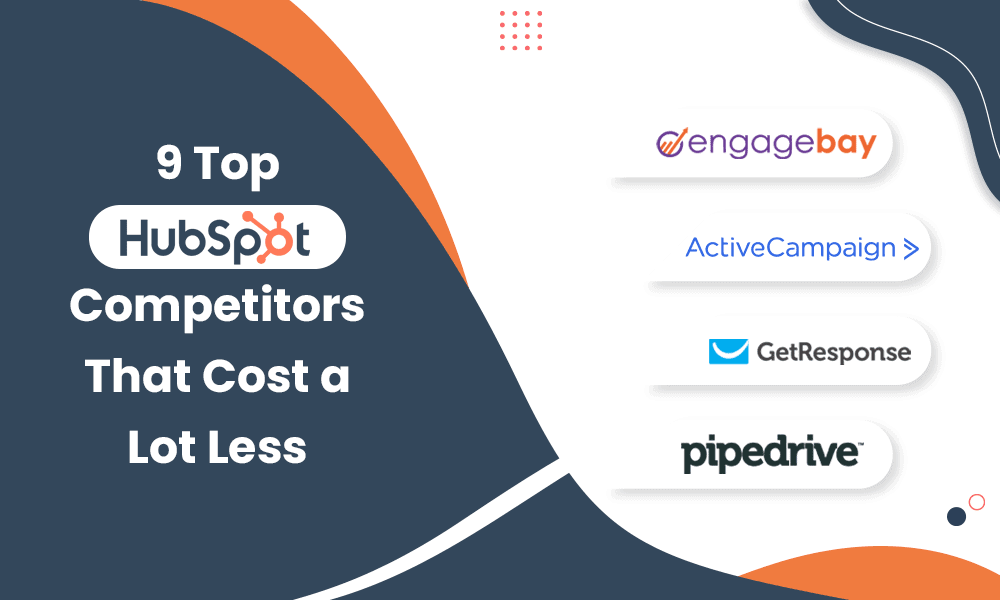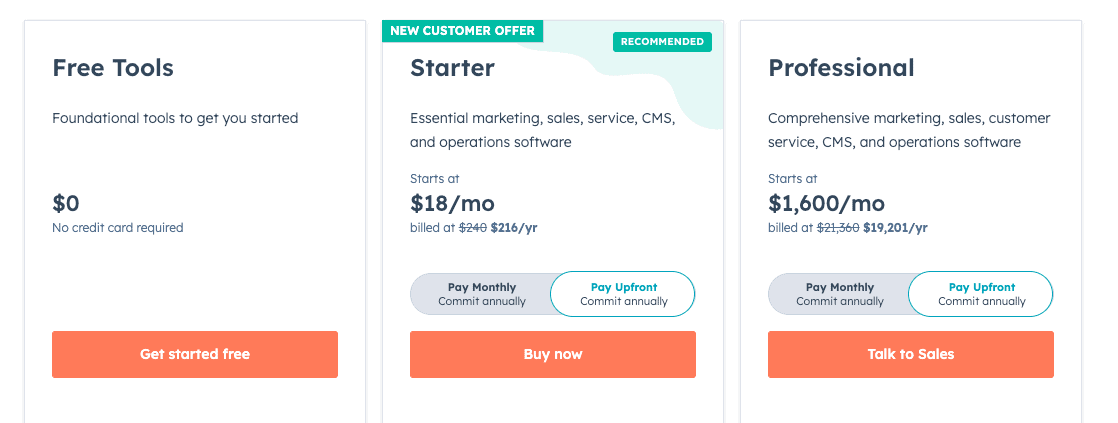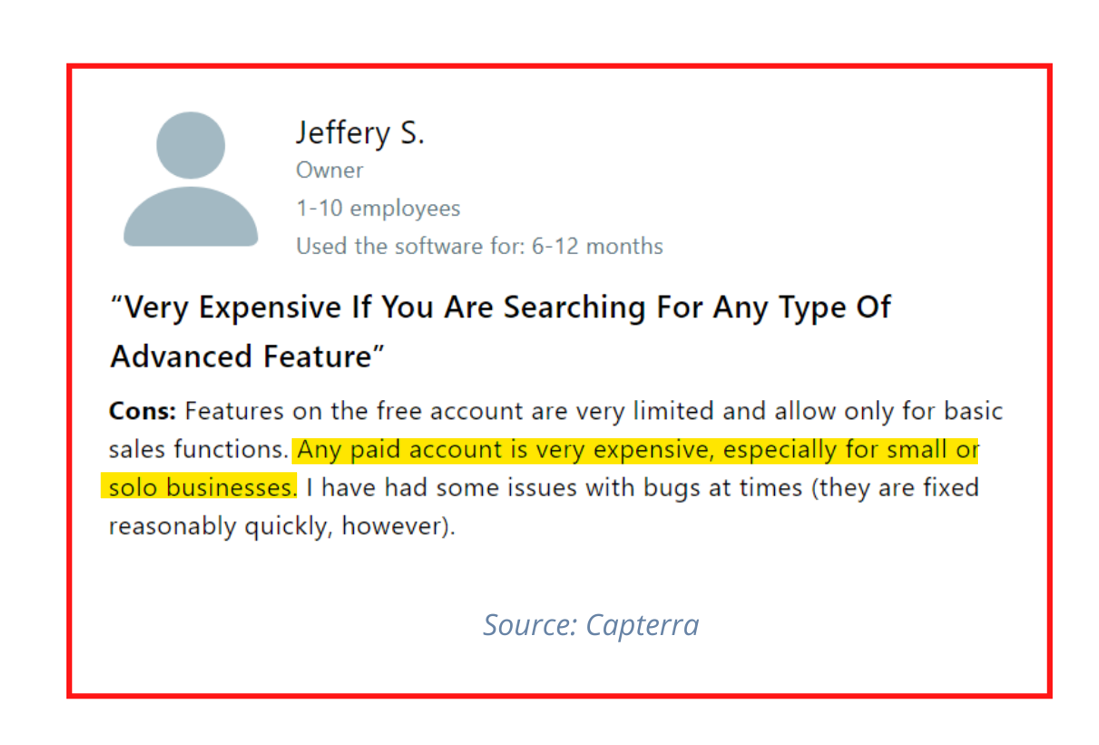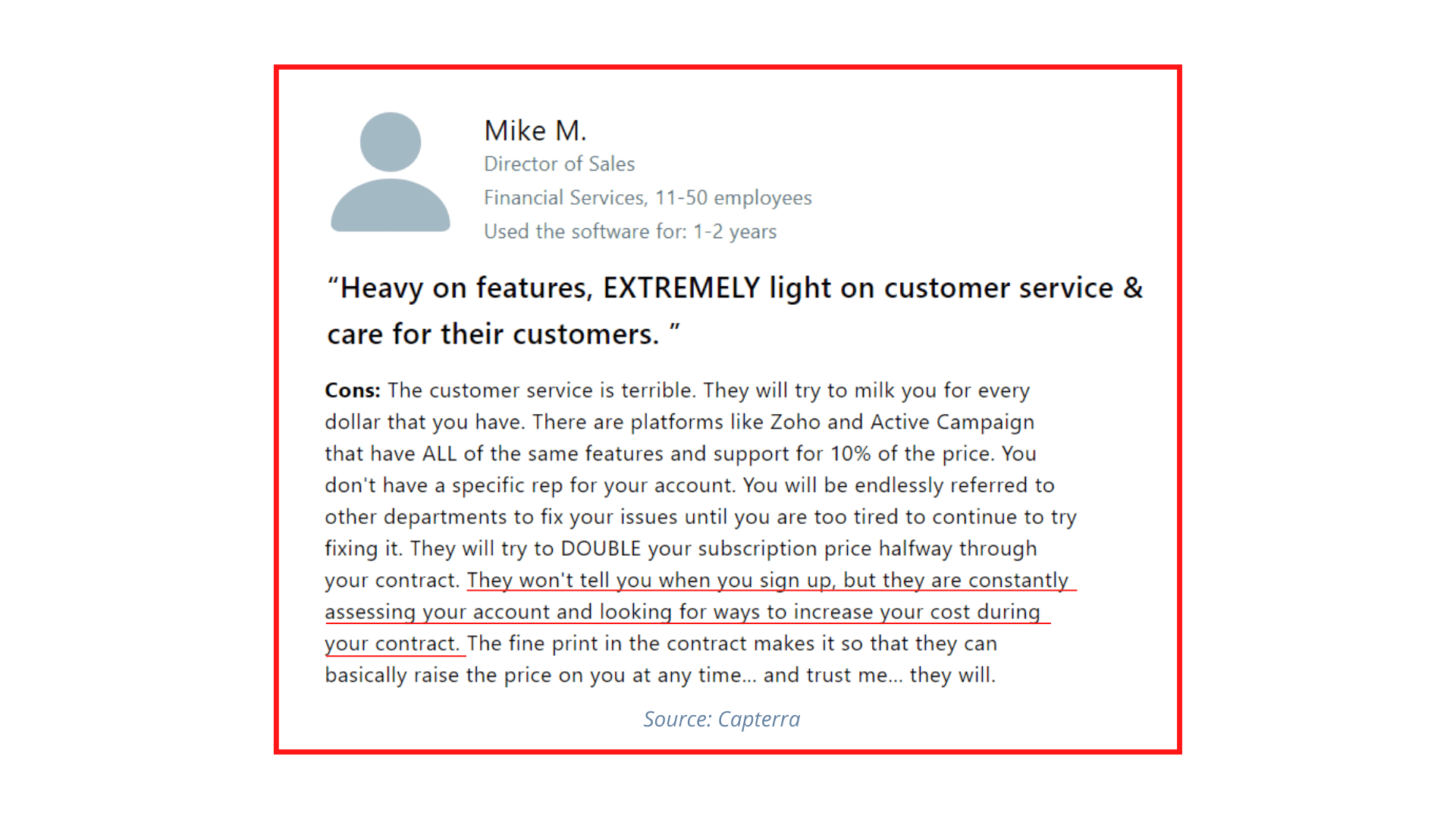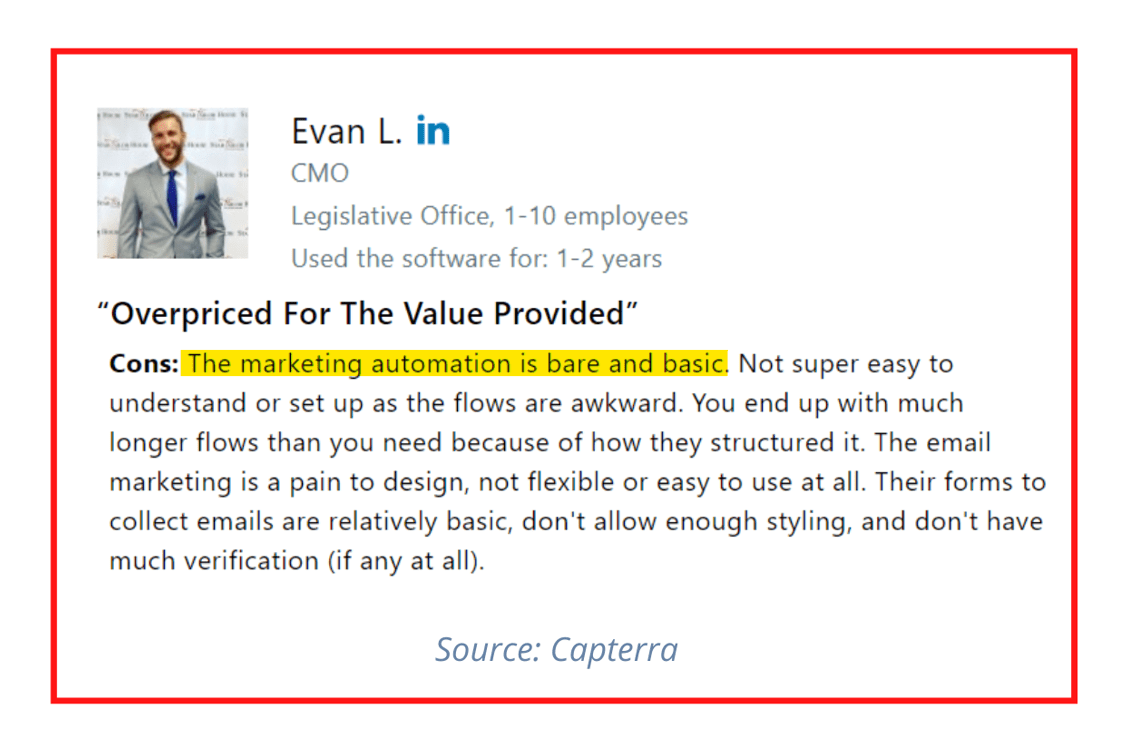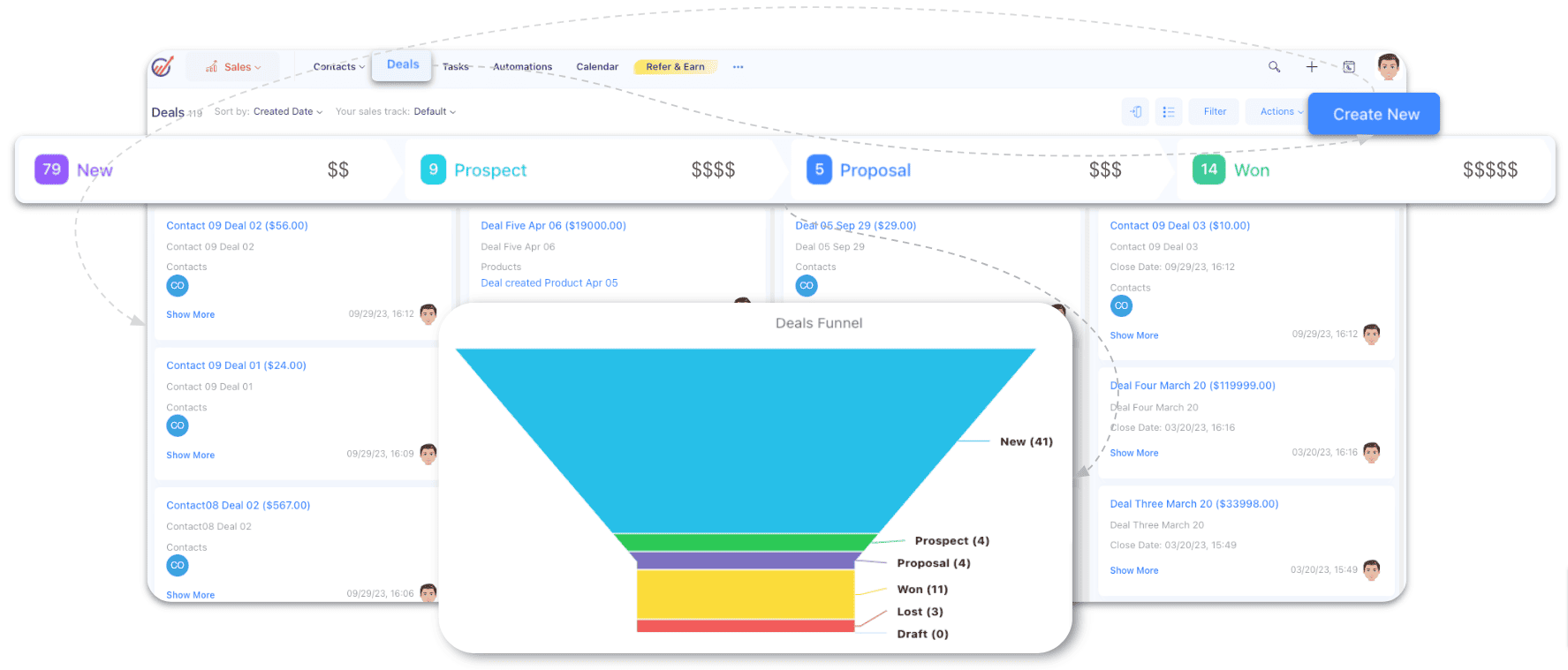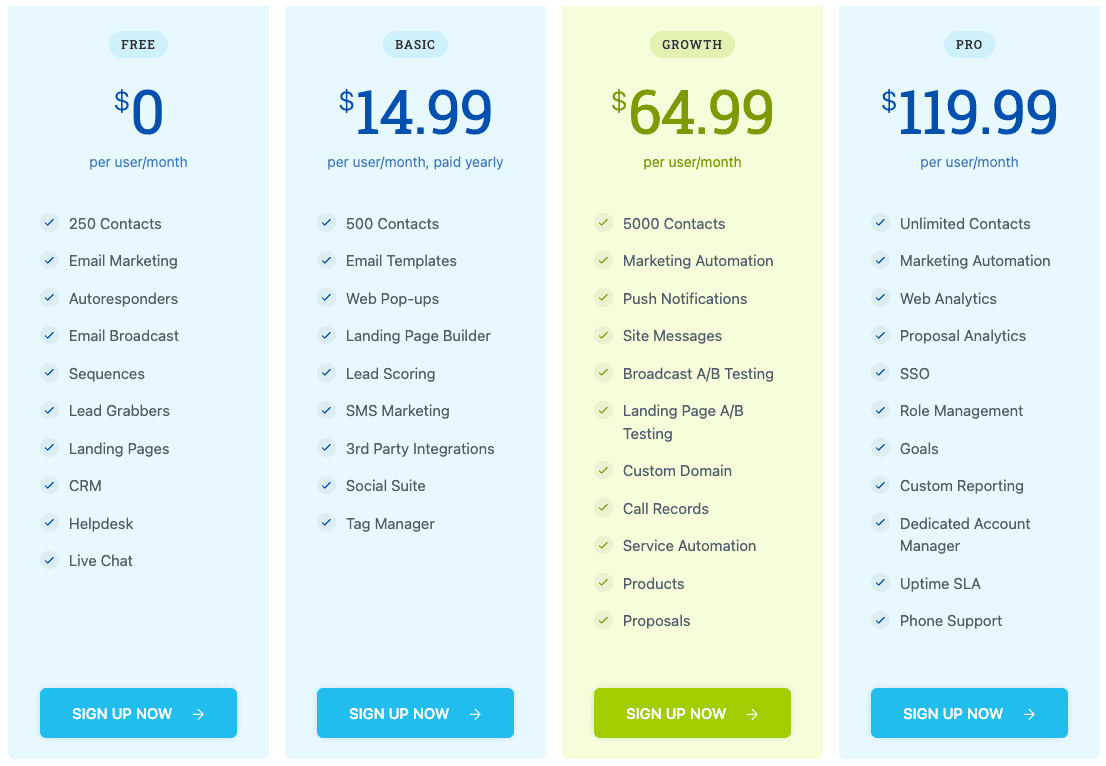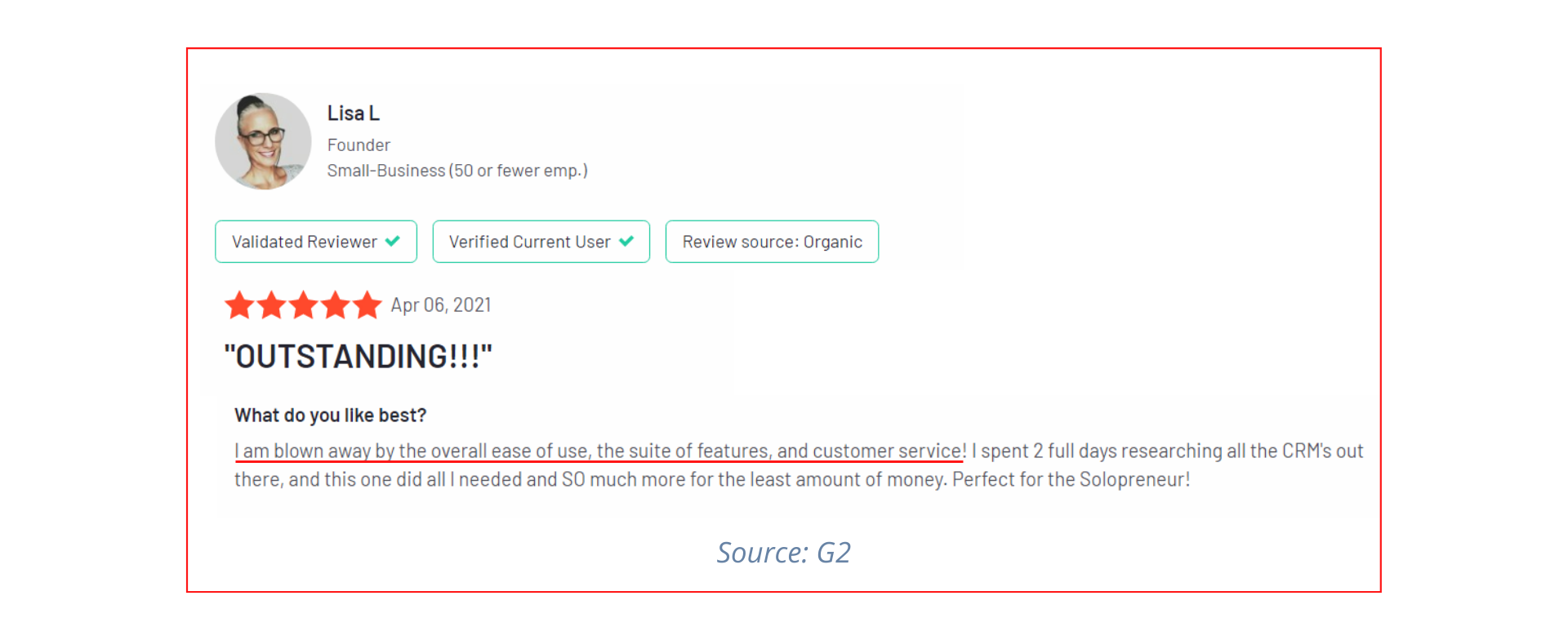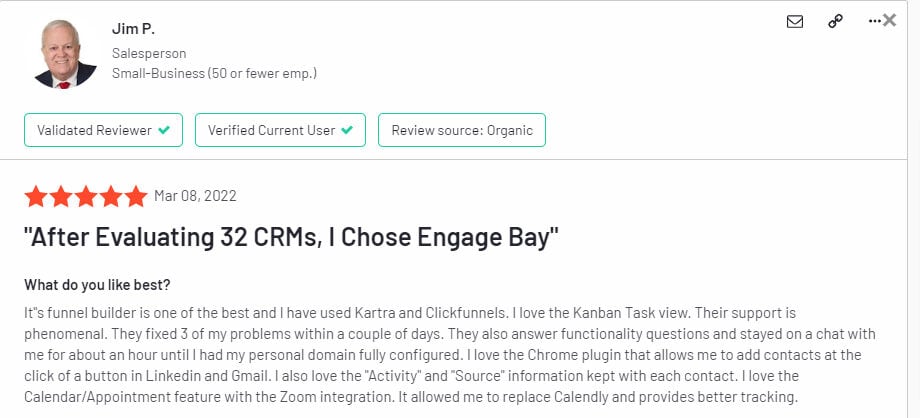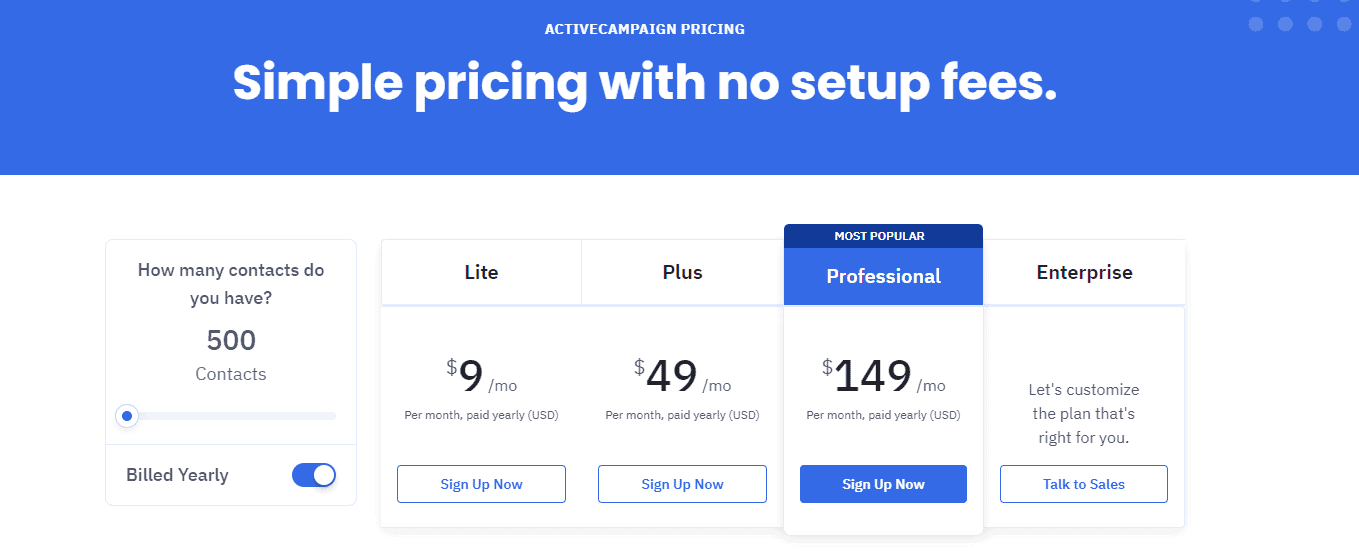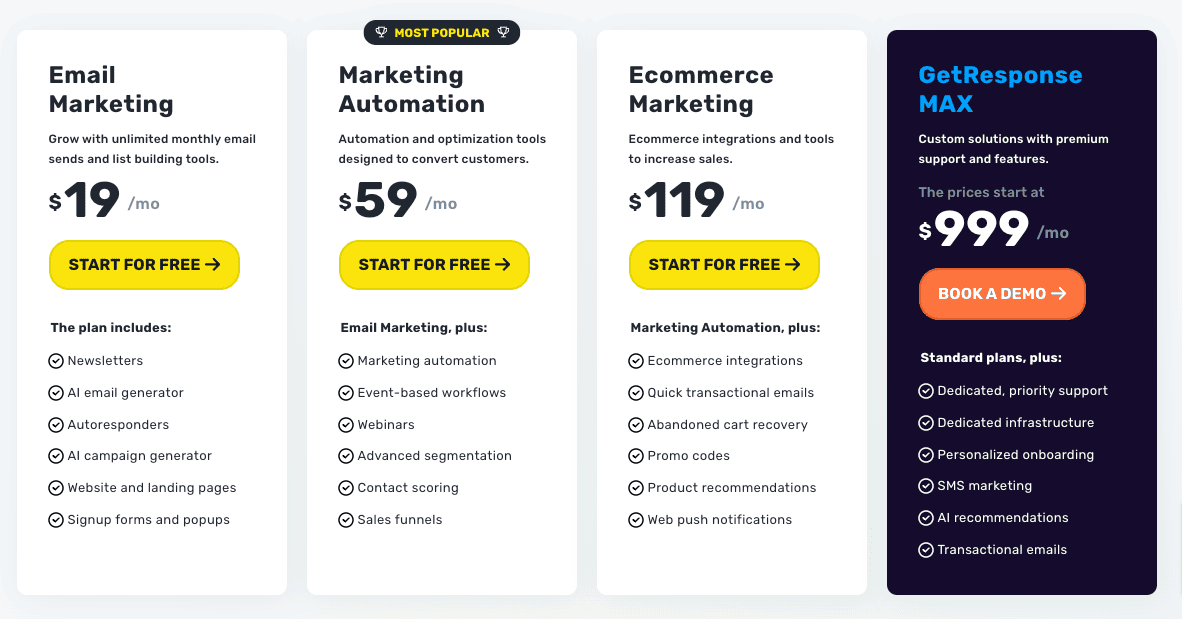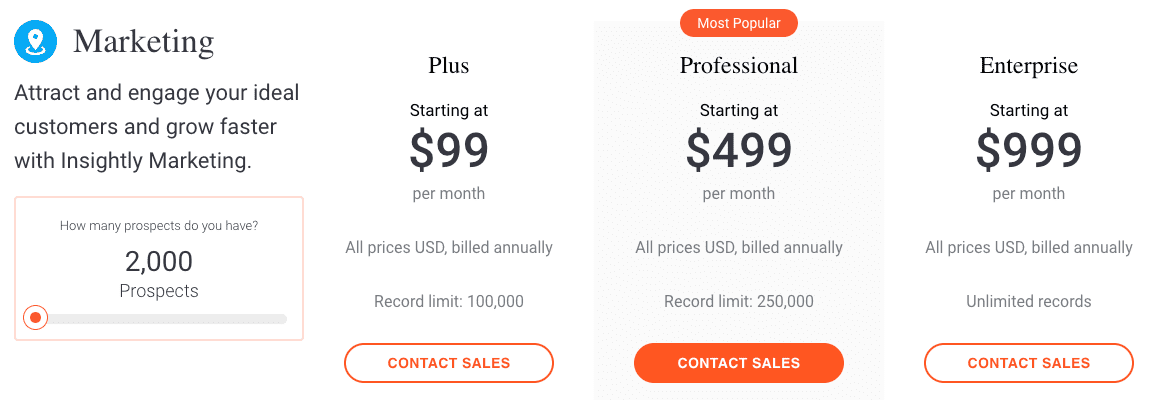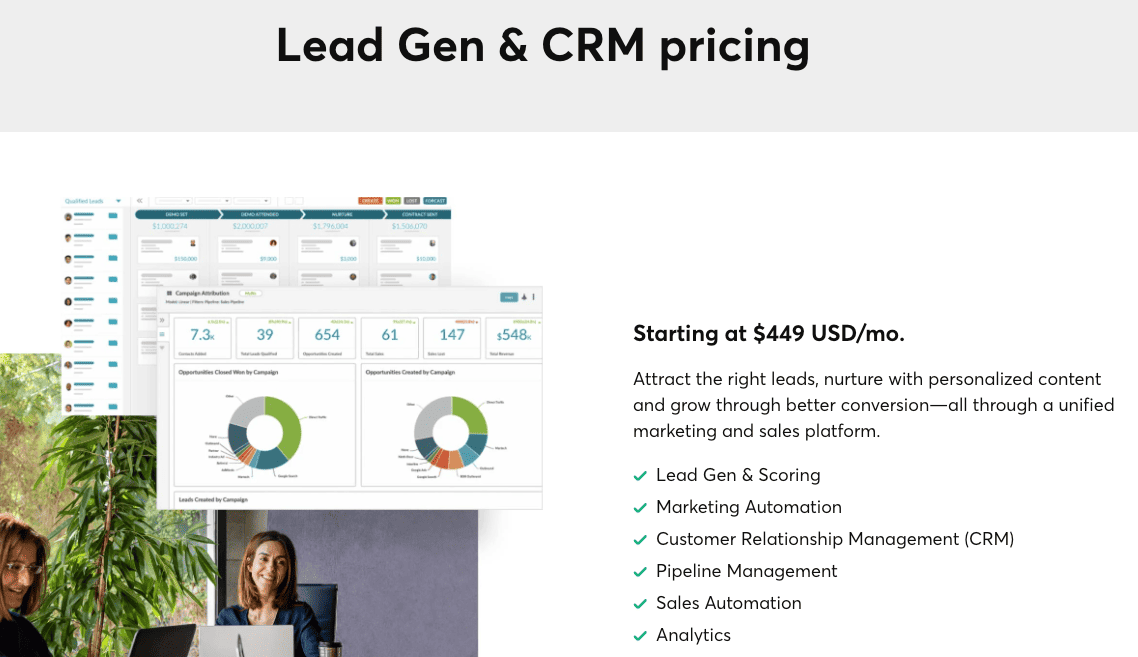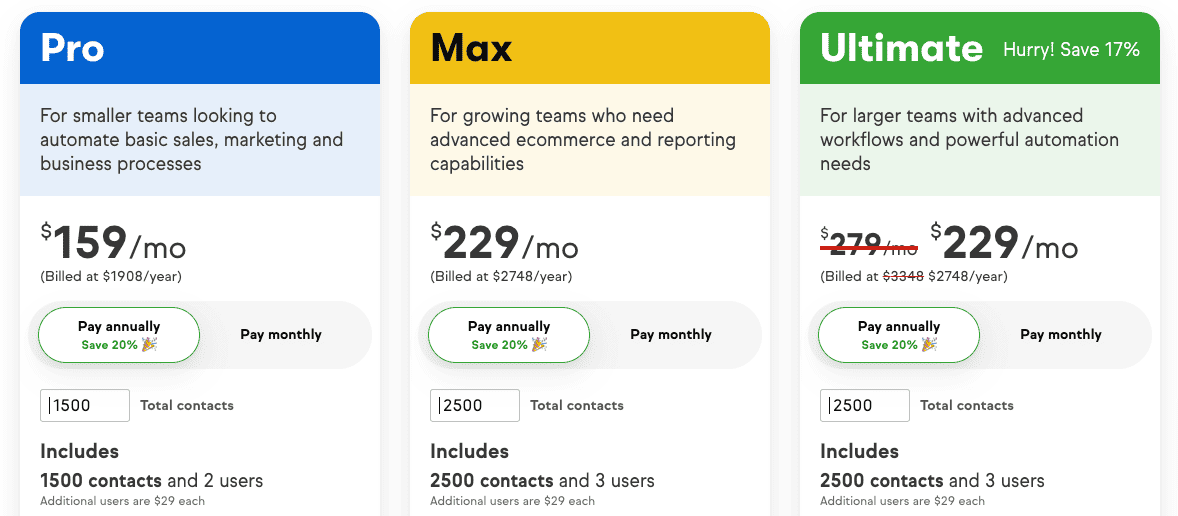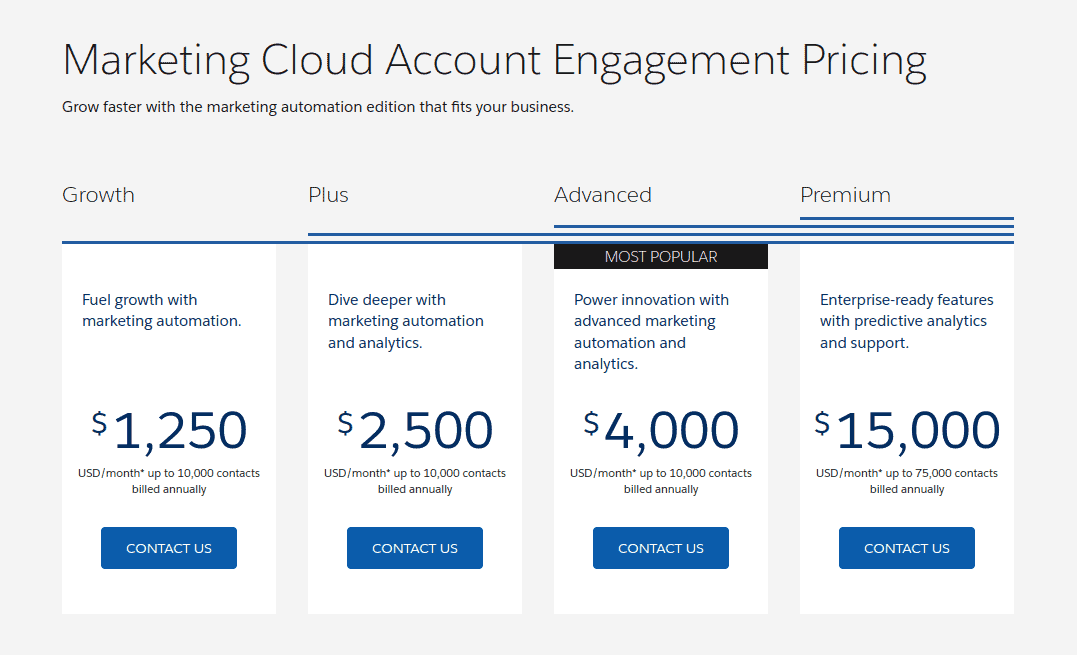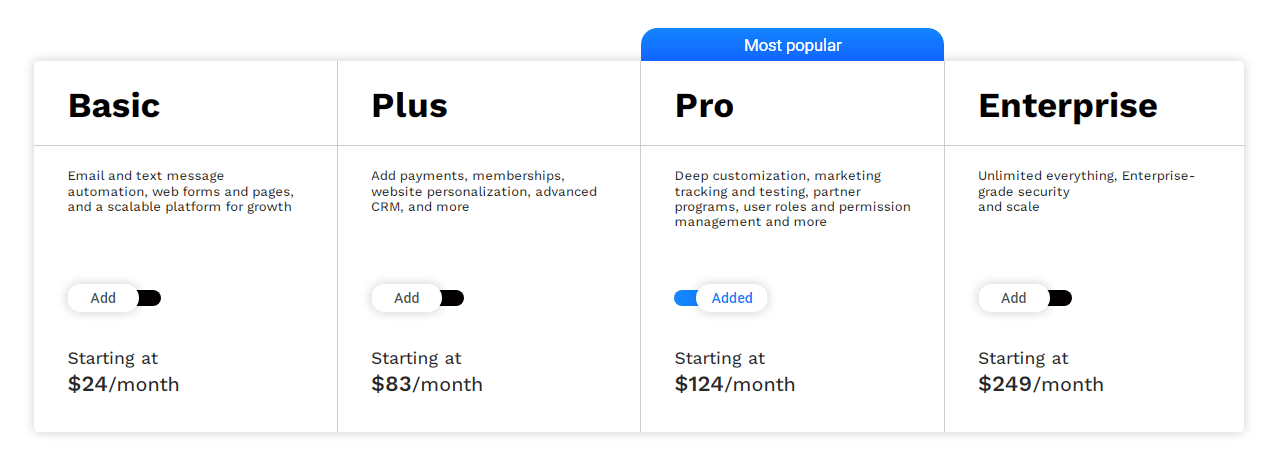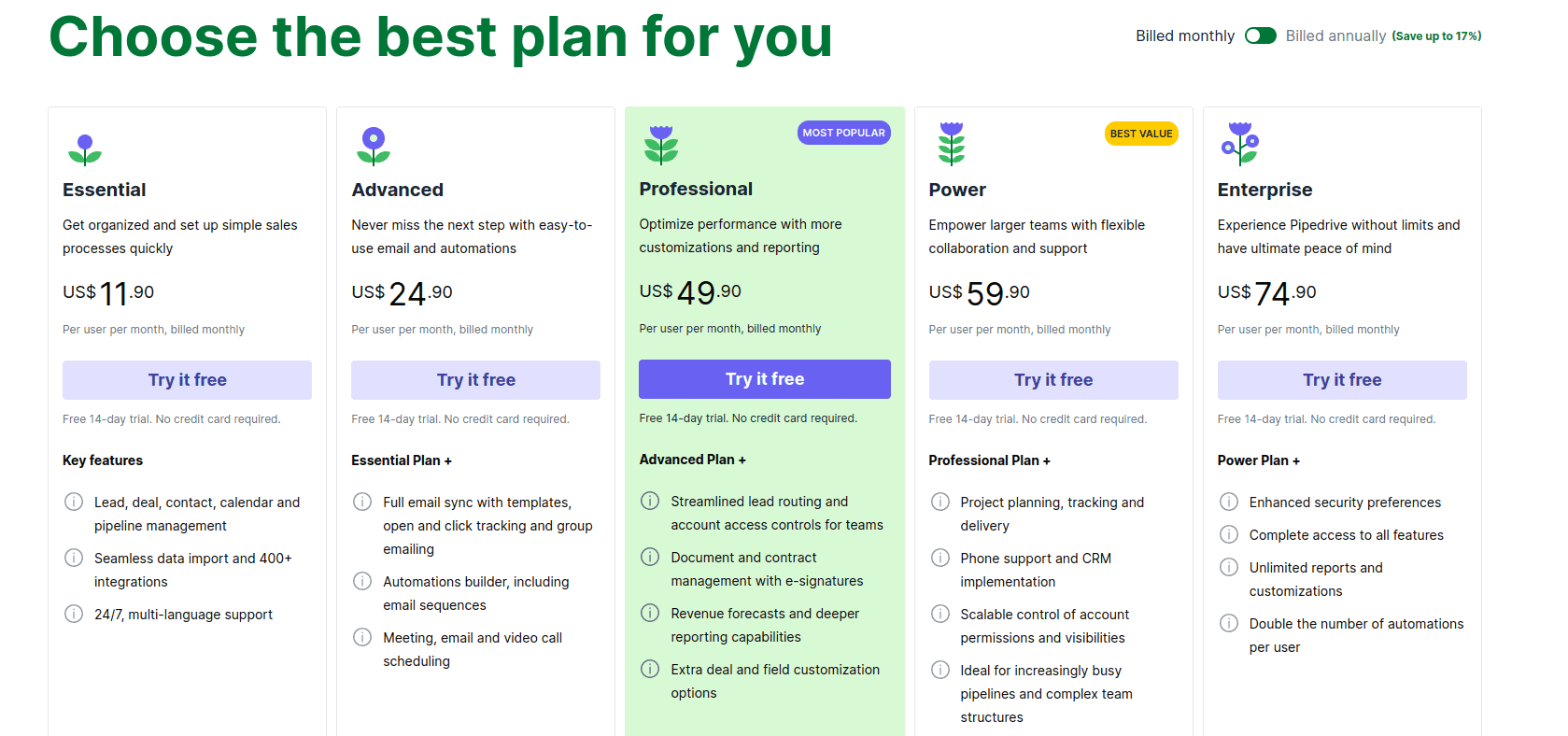Summary
- HubSpot is one of the best CRM software for enterprises, corporations, and larger businesses.
- However, HubSpot may not be the ideal solution for small businesses, startups, and solopreneurs.
- HubSpot’s new 2024 pricing further increases costs, and many SMBs are looking for good HubSpot competitors that offer similar features without the high pricing.
- This blog post covers nine affordable HubSpot competitors, including EngageBay, ActiveCampaign, GetResponse, and more. You also get pricing information, features, and the pros and cons.
Introduction
HubSpot can transform your inbound marketing. HubSpot can redefine your customer outreach and service. HubSpot can automate all your sales, marketing, and customer service workflows.
But HubSpot can also drain your marketing budget!
What companies use HubSpot? Big names come to mind: Accenture, Trustpilot, Strava, Mitsubishi …
Small businesses? Not so much.
If your startup or small business is on a tight budget, you need the right HubSpot competitors.
And you’re in luck. It’s not 2006 anymore, so you can find many great alternatives to HubSpot that rival its digital marketing automation tools, including its CRM hub. There are so many companies similar to HubSpot today that you no longer have to worry about sticking to one platform.
Even better, you don’t have to spend huge amounts on inbound marketing software. Saving on costs using advanced marketing and sales tools is no longer a pipedream.
In this blog post, we’ll introduce nine of the most viable HubSpot competitors in the market. We’ll review each software in detail, explaining the pros and cons. You’ll get pricing details, too.
Let’s get started!
Table of Contents
What Is HubSpot CRM?
HubSpot’s customer relationship management or CRM hub is like its crown jewel. According to HubSpot, they formulated their CRM hub for sales leaders.
Some features of HubSpot CRM are:
- Click-to-call
- Email templates
- Live chat
- Meeting scheduler
- Real-time notifications, such as when a lead opens your email
- Pipeline management
- Lead management
- Deal tracking
- Workflow automation
- Customer data insights
- Up to 1 million contacts
- Customer support
- Productivity and sales activity reports
- HubSpot marketing and sales funnel
Unlike most of its services, HubSpot offers its CRM absolutely free. This isn’t on a trial basis, as the CRM is always free from the day you download it for as long as you use it.
While undoubtedly appealing to small businesses and startups, it can be misleading. HubSpot’s CRM is its only permanently free feature.
These are the plans offered by HubSpot:
- HubSpot Marketing Hub
- HubSpot Sales Hub
- HubSpot Service Hub
- HubSpot CMS Hub
- HubSpot CRM Bundle
See how EngageBay is the best HubSpot alternative.
What Are the Drawbacks of HubSpot?
We’d be remiss to downplay the reputation of HubSpot. That reputation is huge for a reason: HubSpot does offer quality marketing and sales automation features. HubSpot CRM automation is one of the best in the industry, as proved by numerous reviews.
But is HubSpot worth it?
HubSpot for small businesses?
Digging deeper into HubSpot proves how exclusionary it can be if your budget is tight.
Here are the drawbacks of HubSpot.
1. Too expensive for most small businesses
Looks can be deceiving. Upon glancing at HubSpot pricing plans, you’ll undoubtedly be drawn to the Starter plan.
It lets you work with 1,000 contacts and costs $18 a month. Great! That’s perfect for your small business, right?
Not exactly. After some further inspection, you may notice that you get just a few features for your money. These include ad retargeting, email marketing service, list segmentation, forms, bots, live chat, ad management, landing pages, and free CRM.
That’s about it.
Your small business or startup likely can’t get by with those features alone, and who can blame you? That leaves you with the Professional plan, which makes a huge cost jump to $1,780 a month.
Not many small businesses can afford that.
And then there’s the Enterprise plan at a mind-blowing cost of $5,000 a month! For this plan, you must also pay a mandatory one-time fee of $12,000 🙁.
Note: The discounted price of $18/month is available only for new customers. Existing customers must pay $50/month for the Starter plan.
And if you thought HubSpot was expensive, wait till you understand the pricing updates HubSpot has introduced in 2024!
HubSpot’s new pricing explained [2024]
On March 5, 2024, HubSpot introduced major updates to their pricing plans by moving to a seats-based model. On the surface, this move looks promising as it offers much more flexibility.
However, the disadvantage is that this move increases plan pricing.
While we won’t go into details, this table offers a glimpse into what the new changes entail:
| User requirement | Previous pricing structure | New pricing structure |
| Users requiring view-only access to reports, records, and other data | Included in the free plan | Now offered in the free, View-Only seat |
| Users requiring edit access to records and reports, email tracking, and other editable tasks | Included in the free plan | Now offered in the paid, Core seat |
| Users requiring sales and service-specific features | Dedicated Sales and Service seat | Dedicated Sales and Service seat |
This table shows how the new plans either increase costs or decrease functionality, making this the right time for SMBs, startups, and solopreneurs to switch to a HubSpot competitor.
2. Technical support isn’t free
As if you weren’t already spending enough on the Professional or Enterprise plans (at $3,200 a month), what if you need tech support? This doesn’t come free with HubSpot.
Yes, if you have connectivity issues or other fundamental problems with your software, you must pay to resolve them. You must try fixing the issue yourself, which isn’t always doable.
You end up in a lose-lose situation that hinders your productivity and revenue-earning capabilities.
Read also: HubSpot vs MailChimp — A Complete Product Comparison
3. Reporting features aren’t great
For the premium prices of HubSpot’s services, you’d expect some of the most in-depth sales and marketing reporting. Yet that’s not exactly what you get.
HubSpot’s reporting lacks in a few areas, especially user navigation data and segmented traffic reports. Without this reporting, the blind spots in your company’s operations can lead to a business wreck.
4. Templates are not so intuitive
Many similar software providers offer drag-and-drop templates for landing pages, opt-in forms, emails, and more. This allows you to make stunning-looking pages without being a master of coding.
Yet with your HubSpot subscription, to make the most of their templates, it’s recommended you’re at least somewhat good at CSS.
What is CSS? That’s short for Cascading Style Sheets, an HTML-like language for making style sheets.
Not only do you have to spend more money on HubSpot than the competition, but you also have to take the time to learn CSS before using their templates. That makes HubSpot for marketing/sales a huge money-suck as well as a time-suck.
Read also: HubSpot Pros and Cons — A Candid Assessment
5. You can’t customize your contract
Scalability is always a primary concern when selecting sales and marketing tools. You want a marketing automation tool that grows with your small business as you cross new milestones.
That won’t be HubSpot: HubSpot contracts are written in stone.
If you want to cancel your HubSpot subscription three months in because it’s not meeting your expectations, you can’t.
User reviews of HubSpot
While HubSpot may be an excellent platform for large enterprises, it has flaws, too. Let’s check out some of the issues users faced on HubSpot.
Read also: Is HubSpot CRM Truly Free? An Unbiased Guide (with User Reviews)
9 Affordable HubSpot Competitors
As a startup or small business, it’s easy to fall into the HubSpot trap. They have a solid brand image, so they can sometimes feel like your only option.
Before you know it, you’re stuck in a yearlong contract paying way more money than you’d prefer.
There’s a much better way, fortunately. The following nine better HubSpot competitors offer very similar features, and often for a fraction of the cost of HubSpot.
Our list of the best and most cost-effective HubSpot alternatives for small businesses includes:
| HubSpot competitor | Starting price | G2 rating | All-in-one software? | Marketing automation | Sales automation | Live chat feature |
| EngageBay | $12.74/mo | 4.6 | ✔ | ✔ | ✔ | ✔ |
| ActiveCampaign | $29/mo | 4.6 | ✗ | ✔ | ✔ | ✗ |
| GetResponse | $11.31/mo | 4.2 | ✗ | ✔ | ✔ | ✗ |
| Insightly | $99/mo | 4.2 | ✔ | ✔ | ✔ | ✗ |
| SharpSpring | $449/mo | 4.5 | ✗ | ✔ | ✔ | ✔ |
| Keap | $159/mo | 4.2 | ✗ | ✔ | ✔ | ✗ |
| Salesforce Pardot | $1250/mo | 4.0 | ✗ | ✔ | ✔ | ✗ |
| Ontraport | $24/mo | 4.5 | ✗ | ✔ | ✔ | ✗ |
| Pipedrive | $9.90/mo | 4.2 | ✗ | ✔ | ✔ | ✔ |
Let’s take a closer look at each of these.
1. EngageBay
The first HubSpot competitor is a free alternative to HubSpot: EngageBay.
Designed as a HubSpot competitor for small businesses and startups, EngageBay offers a full-fledged sales and marketing CRM platform with features like:
- Marketing tool
- Email marketing automation
- Email sequences
- Live Chat
- Reporting
- Mobile marketing
- Webforms for lead generation
- Appointment scheduling
- Contact management
- 360-degree customer view
- Email and landing page templates
- Lead segmentation and scoring
- Project management
EngageBay divvies up its services into products known as the Service Bay, Marketing Bay, and the CRM & Sales Bay.
More than 46,500 companies have trusted EngageBay for all their sales and marketing needs. (You can read some 5-star user reviews here).
EngageBay integrates with your favorite software, too, including SendGrid, Postmark, Mandrill, Mailgun, Xero, Zapier, and more.
| Features | EngageBay ‘Pro’ | HubSpot ‘Starter’ |
| Marketing automation | ✔ | 𐄂 |
| Landing pages | ✔ | 𐄂 |
| Email & landing page A/B testing | ✔ | 𐄂 |
| Multi-user access | ✔ | 𐄂 |
| Sales deal pipelines | Unlimited | 15 deal pipelines |
| Segmentation | 500 dynamic lists | 25 active lists |
| Emails | 50,000 emails/month | 50,000 emails/month |
| Contacts | Unlimited | 10,000 contacts |
| Price (for 10,000 contacts) | $101.99/month | $408/month |
EngageBay advantages
EngageBay is an advantageous free alternative to HubSpot for the following reasons:
- Most of EngageBay’s services are always free, not just their CRM. This is another way EngageBay caters to startups and small businesses.
- You can use EngageBay as an all-in-one marketing and sales solution for your company.
- EngageBay has lots of great features: drip campaigns, A/B testing (which you can’t get for free with HubSpot), double opt-in emails, and WordPress plugins.
- The detailed reports EngageBay provides will give your company deep and valuable insights for all your marketing campaigns.
- The hubSpot implementation cost is an eye-watering $12,000, while EngageBay onboards you for free.
Read also: EngageBay vs HubSpot — A detailed comparison guide
EngageBay disadvantages
Compared to some HubSpot top competitors out there, EngageBay still needs more integrations. That list is growing all the time, though.
EngageBay pricing
As mentioned, EngageBay has a pricing plan that’s always free. This lets you send 1,000 branded emails to 1,000 contacts each month.
You can also use these features under the free plan:
- Live Chat
- Helpdesk
- CRM
- Facebook Ads
- Video marketing
- Social media marketing
- Landing pages
- Lead grabbers
- Email Sequences
- Email broadcasts
- Email autoresponders
- Email marketing automation, and more
- Basic: Should you need more out of EngageBay, the Basic plan costs $14.99 a month for 500 contacts and 3,000 emails, with basic features like email templates, web popups, landing page builder, lead scoring, SMS marketing, social suite, and more.
- Growth: The Growth plan costs $64.99 a month for 5,000 contacts, 25,000 emails, marketing automation, broadcast A/B testing, custom domain, service automation, and more.
- Pro: The Pro plan starts at $101.99/month and offers unlimited contacts, 50,000 emails, advanced features, including account-based marketing, a dedicated account manager, custom nodes for automation, call scripts, a visual sales pipeline, reports for custom metrics, role management, API for 750,000 calls per month, and more.
The best thing (apart from the prices) about EngageBay is that there’s no learning curve here. It is designed for beginners, so you can just sign up and get started.
And as you can see, the pricing is so competitive it offers a great ROI.
User reviews of EngageBay
Learn more about EngageBay:
Create my free EngageBay account now
2. ActiveCampaign
Another HubSpot competitor to consider is ActiveCampaign. This is a marketing automation platform designed for both marketers and sales teams.
ActiveCampaign offers these features:
- Web personalization
- Marketing campaign management
- Social custom audiences
- Live chat
- Customer messaging
- Email segmentation and marketing
- Templates
- CRM
- Marketing automation
- Machine learning
- Lead scoring
- Website tracking
ActiveCampaign advantages
ActiveCampaign is great for:
- Customer Success Commitment — ActiveCampaign offers free migration, one-on-one training, and support you don’t have to pay for, unlike HubSpot.
- Integrations — More than 300, including Typeform, Salesforce, Shopify, Facebook, Zapier, WordPress, ClickFunnels, and Google Analytics.
- ActiveCampaign app for iOS.
ActiveCampaign disadvantages
You should be aware of these downsides as well:
- ActiveCampaign is more expensive than EngageBay; in EngageBay, you can get a lot of the same features for much less.
- Like HubSpot, ActiveCampaign does not issue refunds.
ActiveCampaign pricing
ActiveCampaign offers four plans:
- Lite: The most inexpensive plan, called Lite, costs $29 a month. However, you only get support for three users and just a handful of features.
- Plus: The Plus plan starts at $49 a month and offers SMS marketing, custom branding, lead scoring, sales automation, and more.
- Professional: The Professional plan is $149 a month, and offers win probabilities, predictive sending, site messaging, and unlimited email sending.
- Enterprise: The Enterprise plan is custom-priced and offers social data, design services, custom mail server domain, uptime SLA, and more.
This is the pricing for 500 contacts. As your contacts increase, so does the price tag.
This is a long piece of writing. If you don’t have time, watch Megan Grant as she gives a quick overview of HubSpot competitors:
3. GetResponse
Among the most popular top HubSpot competitors is GetResponse. This is a marketing automation software catering to small businesses.
GetResponse offers a wide range of marketing solutions like webinar support, autoresponders, landing pages, and conversion funnel.
These are the features offered by GetResponse:
- Drag-and-drop editor for autoresponse messages.
- Advanced timing controls.
- Unlimited daily messages.
- SSL-encrypted webinar URLs with top password protection.
- Customizable webinar URLs.
- Webinar app to stream and record your webinars.
- Webinar analytics, including conversions, survey vote responses, time spent watching the webinar, and the location of viewers.
- Automated communication with scoring and tagging.
- Visual workflows with filters, actions, and conditions.
- Drag-and-drop visual workflow builder.
- Webinar funnels, lead funnels, sales funnels.
- Automated tracking of the customer journey.
GetResponse advantages
- Extensive webinar support.
- Conversion funnel to track the customer journey.
- Free trial for 30 days.
GetResponse disadvantages
- Not a full-fledged CRM software.
- Costly for small businesses with a large contacts database.
GetResponse pricing
GetResponse has five plans.
The free-forever plan offers 1 landing page, signup forms, web popups, a website builder, and 500 contacts.
The ‘Email Marketing’ plan starts at $19 a month, the ‘Marketing Automation’ plan at $59 a month, and the ‘E-Commerce Marketing’ plan at $119 a month. All of these are for a contacts list of 1,000.
‘GetResponse MAX’ offers custom solutions, premium support, and dedicated infrastructure, starting at $999/month.
Read also: GetResponse Pricing — A Comparison With More Affordable Alternatives
4. Insightly
Continuing our list of HubSpot competitors, we have Insightly next.
Insightly combines project management, sales, and marketing into one platform. You can use these features with their marketing automation software:
- Email tracking
- Workflow automation
- Lead routing and segmentation
- Scheduled email sending
- Email templates
- Embedded forms
Insightly advantages
As you shop around and consider your HubSpot competitors carefully, here are some upsides of using Insightly:
- Insightly offers a mobile app for iOS and Android users. This lets you scan business cards and tackle sales and marketing opportunities as they arise, even on the go.
- You can use lots of other software with Insightly, as it plays nice with MailChimp, Proposify, Quotient, Toky, QuickBooks, Gmail, Microsoft Outlook, Xero, Zapier, PandaDoc, and Box.
Insightly disadvantages
Here are the cons of Insightly:
- You can’t buy Insightly’s marketing and CRM software together unless you want to bundle the services. This option has custom pricing, implying a higher cost than regular plans.
- Limited data plans don’t have much storage.
- Insightly’s marketing plans are incredibly expensive, easily rivaling HubSpot’s prices.
Insightly pricing
The Insightly Marketing plans include:
- Plus plan for $99 a month
- Professional plan at $499 a month
- Enterprise plan at $999 a month
Note: calculated for 2,000 prospects
If you only need Insightly CRM, you can pay a lot less. This Plus plan starts at $29 a month, the Professional plan at $49 a month, and the Enterprise plan costs $99 a month.
Read also: The 5 Best CRM Tools for Small Businesses
5. SharpSpring (Now Constant Contact)
Our next option on the list of top competitors to HubSpot is SharpSpring. As a platform for marketers and sales professionals, SharpSpring also includes a CRM service. SharpSpring is now acquired by Constant Contact, and has since been rebranded as ‘Lead Gen & CRM’.
Check out this link for more information.
Here are the features included in their Sales & Marketing platform:
- Social media content calendar
- Multi-device lead tracking
- Web analytics
- Blog builder
- Landing page builder
- Visitor IDs
- Automation workflows
- Form builder
- Email marketing
SharpSpring advantages
The advantages of a SharpSpring subscription are as follows:
- You can select pricing plans based on the size of your business.
- SharpSpring has an App Marketplace featuring integrations. These include Zapier, Hello Bar, CloudCart, TradeGecko, 123FormBuilder, 24Sessions, InvoiceBerry, Upcall, Follow Up Boss, and Yocale.
SharpSpring disadvantages
On the downside:
- Pricing is high (comparatively).
SharpSpring pricing
Since getting acquired by Constant Contact, SharpSpring has undergone pricing changes. This is the new plan:
- Lead Gen & CRM: Starting at $449/month, this plan offers lead gen, lead scoring, marketing automation, CRM, pipeline management, sales automation, and analytics.
Read also: 9 Challenges of CRM Implementation & How to Dust Them Off
6. Keap
Keap, formerly known as InfusionSoft, is a marketing and sales automation CRM software designed for mid-sized companies.
Keap offers these features:
- Contact management
- Contact segmentation
- B2B management
- Landing pages
- Lead scoring
- Appointments
- Sales pipeline
- Email marketing
- A/B email testing
- Sales funnel
Keap advantages
- Keap is quite easy to use, with numerous praises for its clean and simple interface.
- Rebranding to Keap came with a suite of tools for small businesses.
- Good automation features.
Keap disadvantages
- Keap does not offer customer support automation features.
- No omnichannel marketing feature.
- Keap is not an all-in-one CRM software.
- It’s expensive for small businesses.
- Mandatory onboarding fees.
Keap pricing
Keap offers three plans:
- Keap Pro: Costs $159/mo for 1,500 contacts and 2 users.
- Keap Max: Costs $299/mo for 2,500 contacts and 3 users.
- Keap Ultimate: Starts at $229/month and is designed for advanced sales and marketing team needs.
Read also: 11 of the Best Keap (Infusionsoft) Alternatives
7. Salesforce Marketing Cloud Engagement (fka Pardot)
Salesforce Pardot, now called Salesforce Marketing Cloud Engagement, is a B2B marketing automation software to help marketers identify prospects and convert them into customers.
These are the key Salesforce CRM (Pardot) marketing features:
- Lead generation
- Email marketing and personalization
- Advanced analytics and reporting
- Predictive analytics and personalized product support
- Powerful integrations
Pardot advantages
- Salesforce Pardot is a great option for enhanced data visualization.
- Integrates well with Salesforce.
- Great customer support.
Pardot disadvantages
- No free plan.
- Too expensive for small businesses.
- Limited tools for team organization.
Pardot pricing
Salesforce Marketing Cloud Engagement (Pardot) offers four plans:
- Growth: $1,250/mo for 10,000 contacts
- Plus: $2,500/mo for 10,000 contacts
- Advanced: $4,000/mo for 10,000 contacts
- Enterprise: $15,000/mo for 75,000 contacts
Please check Salesforce’s official site for pricing changes, if any.
Read also: A simple but in-depth guide on Salesforce (CRM)
8. Ontraport
Ontraport is another excellent sales and marketing platform designed for growing businesses. What’s unique about Ontraport is that it adds payment features like referral tracking, order forms, offline transactions/transactional emails, and more.
Let’s take a look at the key features of Ontraport:
- Drag-and-drop marketing automation
- Web forms
- Web page builder
- Task automation
- Lead routing
- Video hosting
- Online order forms
- Funnel conversion tracking
- Split testing
Ontraport advantages
- Reasonably priced.
- Offers a visual campaign builder.
- Less price creep compared to some of the other competitors of HubSpot.
Ontraport disadvantages
- A bit complicated to use.
- Has only a few integrations.
- Not easy to clean up duplicate records.
Ontraport pricing
Ontraport offers four plans:
- Basic: Costs $24/mo for 500 contacts
- Plus: Costs $83/mo for 500 contacts
- Pro: Costs $124/mo for 500 contacts
- Enterprise: Costs $249/mo for 500 contacts
👉Want to switch from Ontraport? Our article on the best Ontraport alternatives provides all the information you need to make the right choice.
9. Pipedrive
Pipedrive is an excellent sales CRM alternative to HubSpot CRM. Designed ‘for salespeople, by salespeople’, Pipedrive offers a plethora of features, including:
- Customizable pipelines
- Deal management
- Deal rotting
- Activity management
- 2-way email sync
- Activity reports
- Visual dashboards
- Team management
Pipedrive advantages
Pipedrive is an excellent CRM for sales:
- Sales first: Fields and pipelines that are fully customizable so that your sales team can make the platform their own. Deal management and rotting ensure that your sales reps always hit the goal.
- Automation: Pipedrive’s AI sales assistant delivers useful insights, tips, and advice to help reps close more deals. The automation builder helps set up a consistent sales process and improves productivity.
Pipedrive disadvantages
Just like pros, Pipedrive is not without its cons:
- Unlike HubSpot and EngageBay, Pipedrive does not offer a unified marketing, sales, and customer support solution. This means you can’t offer an omnichannel customer experience.
- Some users feel report configurations to be a bit overwhelming.
Pipedrive pricing
Pipedrive offers five plans:
- Essential: Costs $9.99/month for 3,000 daily deals, deal management, AI sales assistant, and more.
- Advanced: Costs $19.90/month for 10,000 daily deals, 2-way email sync, and customizable email templates.
- Professional: Costs $39.90/month for 100,000 daily deals, formula fields, team management, and contact timeline.
- Power: Costs $49.90/month and offers project planning, CRM, phone support, account permissions, and more.
- Enterprise: Costs $59.90/month for unlimited daily deals, enterprise-grade features, and security.
Read also: 13 Perfect Pipedrive Alternatives That Can Do More
Conclusion
We understand that HubSpot is the oldest and biggest player in the inbound marketing industry today. But if it’s out of reach for your small business, how does it help you?
The nine HubSpot CRM competitors we discussed in this post are all worth your consideration. They can help you with effortless marketing, smooth sales, and efficient customer service.
As for the top pick among these nine HubSpot competitors, we’d say that’s EngageBay. It is built for startups and small businesses and does nearly everything HubSpot can do.
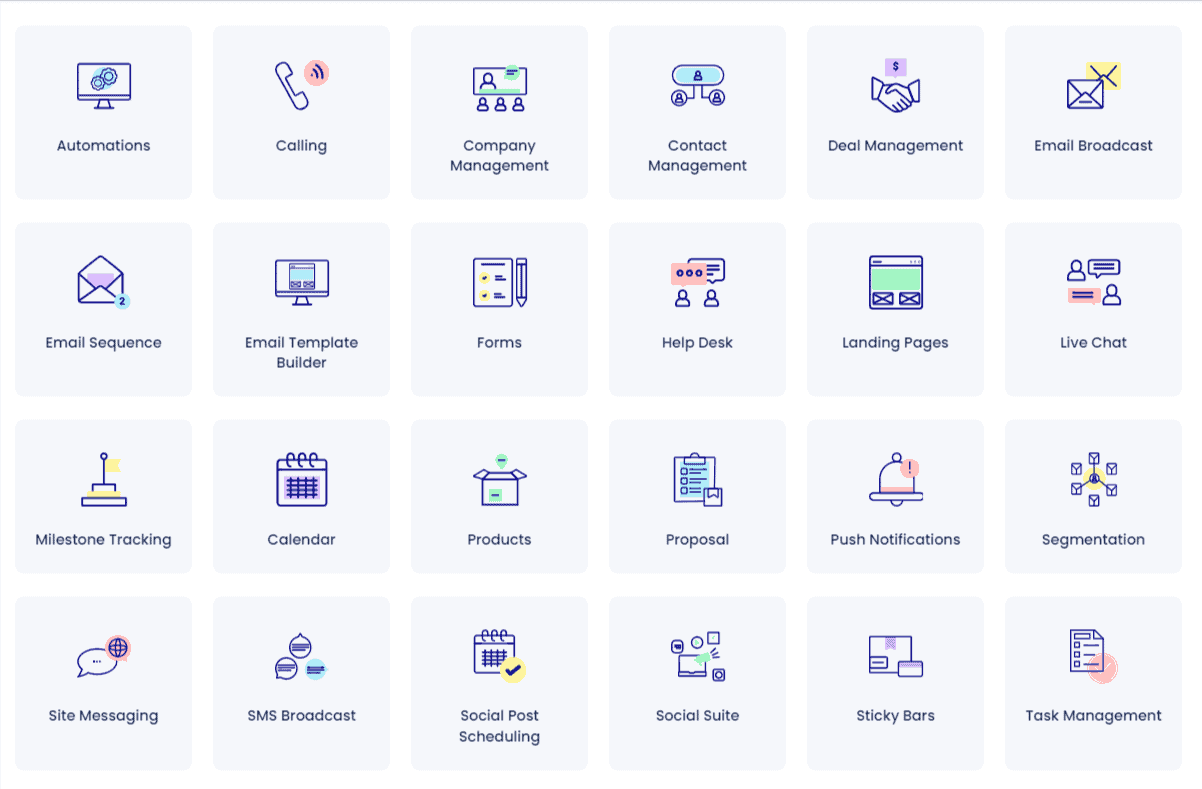
EngageBay offers a comprehensive sales, marketing, and CRM software solutions. You can use it for free forever, and even an upgrade costs less than your weekly coffee budget!
Is there a better CRM than HubSpot? Let us know in the comments.
Related reading:
- The best CRM Tools for Small Businesses
- The 14 Best CRM Automation Software in 2024
- 15 Best Marketing Automation Tools for Small Businesses
- Is HubSpot Worth It? In-Depth HubSpot Review for Small Businesses
Frequently Asked Questions (FAQ)
1. Is there a better CRM than HubSpot in 2024?
For startups and small businesses, EngageBay is better than HubSpot as you get similar features at a fraction of the price. Opting for EngageBay could mean saving more than 80% of costs.
Yes, there are better platforms than HubSpot. For example, Salesforce has been consistently ranked #1 CRM in the world by IDC – but top CRM solutions like these are designed for large businesses and MNCs. These CRM platforms are complex, expensive, and need ample training.
Small businesses need an affordable, easy-to-use CRM software that can be quickly set up. This is why EngageBay is an excellent HubSpot alternative for SMBs, solopreneurs, and startups.
2. What platforms are similar to HubSpot?
So, who are HubSpot’s competitors?
Here is a list of the best HubSpot competitors for startups and small businesses: EngageBay, ActiveCampaign, GetResponse, Insightly, SharpSpring, Keap, Ontraport, and Salesforce Marketing Cloud Engagement (fka Pardot).
Each platform is similar to HubSpot and is designed for a specific type of business.
For small businesses, Engagebay and ActiveCampaign are excellent choices. ActiveCampaign offers only marketing automation, though, so if you want a comprehensive marketing, sales, and customer support software, go for EngageBay.
3. Is HubSpot really worth the cost in 2024?
HubSpot is a great CRM platform for businesses that need an all-in-one software.
HubSpot also charges a bomb, which is why we ask the question, ‘Is HubSpot worth the money?’
HubSpot is great for large companies and businesses with huge marketing funds. However, HubSpot is too expensive for SMBs and startups.
Though deceptively affordable at first, HubSpot pricing quickly shoots up to thousands of dollars a month – just the onboarding could cost as high as $5,000!
We recommend choosing more affordable HubSpot CRM alternatives (including the ones mentioned in this blog post). For startups and SMBs, EngageBay offers the same all-in-one approach and ease-of-use as HubSpot, but without the costly plans.
4. What updates has HubSpot made to the free tools in 2024?
HubSpot’s free plan now includes only 5x Core seats for free, with unlimited View-Only seats. Users who enjoyed edit access for free will either have to upgrade to a paid Core seat, or do away with view-only access.
5. Does HubSpot’s new seat-based pricing structure affect existing customers?
The seat-based pricing structure currently only affects new customers, meaning you won’t be requested to switch to the new plans immediately. However, there’s a good chance that users will have to adopt the new structure during the next renewal.
6. How much does HubSpot cost per user per month in 2024?
This is how much HubSpot CRM Suite costs:
| HubSpot CRM Suite Pricing | ||
| Plan | Contacts | Cost |
| HubSpot CRM Suite Starter | 1,000 contacts | $45/mo ($18/mo for new customers) |
| HubSpot CRM Suite Professional | 2,000 contacts | $1,600/mo |
| HubSpot CRM Suite Enterprise | 10,000 contacts | $5,000/mo |
